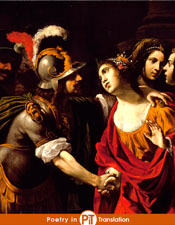The Aeneid
, translated by Kline, A. S. (contact-email)
In Virgil’s “Aeneid,” Aeneas escapes Troy’s downfall to establish Rome, thereby legitimizing Rome’s imperial lineage and providing a national myth. Aeneas embodies Roman virtues of loyalty and resolve, and the narrative incorporates elements suggesting Rome’s foundation was destined following Troy’s collapse. The work bridges Greek and Roman epic traditions, situating Aeneas as Romulus’s forbearer. Virgil’s influence extends into later Roman and European literature; notably, Dante employs him as a guide in “The Divine Comedy,” acknowledging his roles in empire-building, poetic tradition, and prefiguring Christianity.

Kline, A. S.
Support Open-Access:
Your contribution keeps our classical translations available to all. Every dollar helps support classics education and funds the expansion of our catalogue. Value what we do? Donate now.
File Downloads:
© Copyright, All Rights Reserved. This work may be freely reproduced, stored and transmitted, electronically or otherwise, for any non-commercial purpose. Conditions and Exceptions apply.